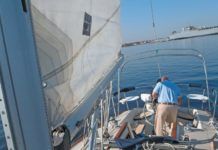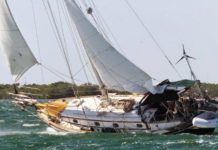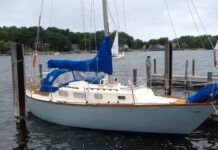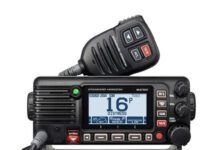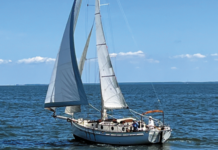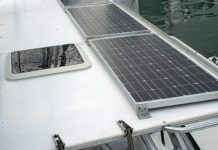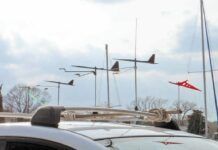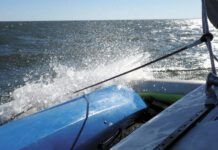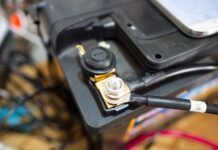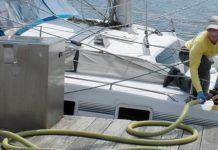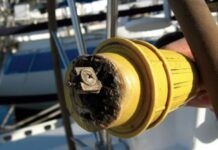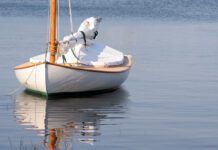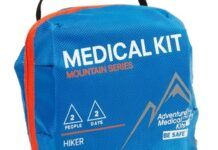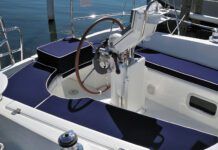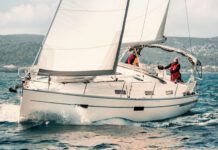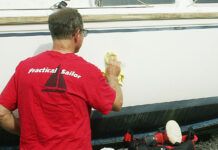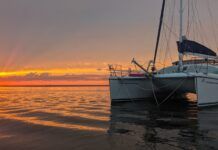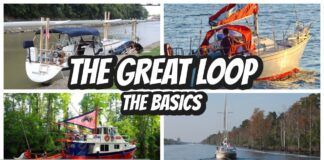Its a complex world. Or so said some forgettable rock n roll band. So is the world of sailing.
Here are a few items of relevance:
Globe Wireless, the last US network of coastal radio stations using the Morse code, ceased transmissions last July. The International Maritime Organization (IMO) had already phased out Morse code last February 1, and the US Coast Guard stopped monitoring radio frequencies used for the code several years ago. In its place we now have the Global Maritime Distress and Safety System (GMDSS).
Our kids are incredulous that we remember the days before television. Now, with the demise of Morse code and telegraphy, we can expect our explanations of SOS to grandchildren watching the sinking of the Titantic to be met with a lazy Huh? Thanks to technology we have yet another reminder that we are traveling down the same long trail toward obsolescence as the telegraphers tap-tap-tap first heard when on May 24, 1844 Samuel Morse sent his historic message from Washington to Baltimore, What hath God wrought?
Given all the confusion concerning GMDSS, one might ask the same question of it.
Legislators in Florida, Connecticut, Maine, Pennsylvania and New York are considering lemon laws for boats. Many states have lemon laws for automobiles, which bring relief to owners with such severe or persistent problems that they deserve a replacement or their money back. The National Marine Manufacturers Association (NMMA) is opposed to lemon laws for boats, arguing that boats have two major warranties (the boat and the engine); and that dealers play a larger role than in the auto business. The NMMAs most ridiculous assertion, however, was uttered by vice-president Mick Blackistone, who said, The vast majority of the problems are brought on by the owner himself, adding that some owners who want their money back have simply gotten in over their heads financially. We don’t doubt that boat owners are capable of doing stupid stuff, but to cite the ineptitude of a few as reason to absolve an inept boat builder is ludicrous. The word we get is that these proposed laws have little chance of passing unless voters (you!) let your legislators know how you feel. If you read our July 1, 1999 report on warranties, tell them also that the keel and rudder really are parts of a boat.
Viva, our 1975 Tartan 44 test boat is for sale. She is one of just eight Tartan 41s factory-modified with a 3-foot transom extension. Charlie Britton, the late president of Tartan Yachts, built the first 44 for himself, which he campaigned in the Southern Ocean Racing Circuit. Viva has been extensively upgraded. $65,000. Call me at 401/683-4138 or send an e-mail to PSBelvoir@aol.com.
Delegates of the 50,000-member Izaak Walton League, named for the 17th-century conservationist and author of The Compleat Angler, voted to call for a national ban on two-stroke engines. This move follows the organizations damning report: Caught in the Wake: The Environmental and Human Health Impacts of Personal Watercraft. Two-stroke engines are also used in outboard motors, snowmobiles, all-terrain vehicles and motorcycles. The report says that PWCs discharge up to one-third of their fuel, unburned, during engine use. The fuel contains hydrocarbons, carcinogenic benzene and toluene, the report adds.
Reader Query of the Month: How can I get e-mail on my boat? Were working on it, including an evaluation of the $1,000 Magellan GSC 100 Personal Satellite Communicator.
And we thought the idea of cruising was to get away from the rat race?!
-Dan Spurr


